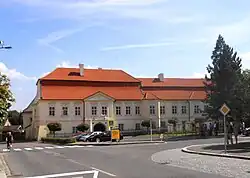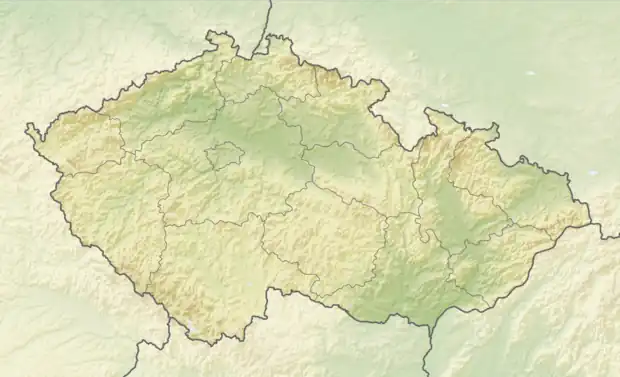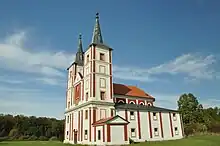Chrast | |
|---|---|
 Chrast Castle | |
 Flag  Coat of arms | |
 Chrast Location in the Czech Republic | |
| Coordinates: 49°54′8″N 15°56′2″E / 49.90222°N 15.93389°E | |
| Country | |
| Region | Pardubice |
| District | Chrudim |
| First mentioned | 1318 |
| Government | |
| • Mayor | Vojtěch Krňanský |
| Area | |
| • Total | 17.84 km2 (6.89 sq mi) |
| Elevation | 285 m (935 ft) |
| Population (2023-01-01)[1] | |
| • Total | 3,159 |
| • Density | 180/km2 (460/sq mi) |
| Time zone | UTC+1 (CET) |
| • Summer (DST) | UTC+2 (CEST) |
| Postal code | 538 51 |
| Website | www |
Chrast (Czech pronunciation: [ˈxrast]) is a town in Chrudim District in the Pardubice Region of the Czech Republic. It has about 3,200 inhabitants. The historic centre with the castle complex is well preserved and is protected by law as an urban monument zone.
Administrative parts

Villages of Chacholice, Podlažice and Skála are administrative parts of Chrast.
Geography
Chrast is located about 11 kilometres (7 mi) southeast of Chrudim and 18 km (11 mi) southeast of Pardubice. It lies in the Svitavy Uplands. The highest point is the elevated plain Kostecká hůra at 432 metres (1,417 ft) above sea level. The town is situated on the right bank of the Žejbro Stream. Horecký Pond is located south of the town.
The slope on the right bank of the stream is protected as the Chrašická stráň Nature Monument.[2]
History
The oldest part of Chrast is Podlažice. The Benedictine monastery in Podlažice was founded in 1159.[3] The monastery is where the Codex Gigas (or "Devil's Bible") was produced. It remains the largest extant medieval manuscript. However, it is unlikely that the book was written at the monastery due to its small size and meagre funds.[4]
The first written mention of Chrast is from 1318. It was founded in the second half of the 13th century by monks from the Podlažice Monastery. The monastery was destroyed by the Hussites in 1421.[3][5]
In 1539, Chrast was acquired by the noble Slavata of Chlum and the Košumberk family. In the early 17th century, Albrecht Slavata had built a castle here. In 1664, Chrast was bought by Hradec Králové Bishopric. The castle served as the summer residence of several bishops. In the 18th century, it was rebuilt and extended.[5] In 1853, Chrast was promoted to a town.[3]
Demographics
|
|
| ||||||||||||||||||||||||||||||||||||||||||||||||||||||
| Source: Censuses[6][7] | ||||||||||||||||||||||||||||||||||||||||||||||||||||||||
Sights
The Baroque castle currently houses the Town Museum, which was founded in 1893. The former castle chapel is today a concert hall. The adjacent castle garden was created in 1903.[8]
The landmark of the town square is the Church of the Holy Trinity. It was built in 1612–1618 by renewal of an old church and reconstructed to its current form in 1774. The oldest church in the town is the cemetery Church of Saint Martin. It comes from 1350. Church of Saint Margaret the Virgin in Podlažice and Church of Saint John the Baptist in Skála were both founded in 1696.[8]
Notable people
- Johann Leopold Hay (1735–1794), Bishop of Hradec Králové; died here
- Antonín Machek (1775–1844), painter
- Ludwig August von Frankl (1810–1894), Bohemian-Austrian writer and poet
- Martin Dejdar (born 1965), actor
References
- ↑ "Population of Municipalities – 1 January 2023". Czech Statistical Office. 23 May 2023.
- ↑ "Chrašická stráň" (in Czech). Nature Conservation Agency of the Czech Republic. Retrieved 25 August 2023.
- 1 2 3 "Historie Chrasti" (in Czech). Město Chrast. Retrieved 20 October 2021.
- ↑ "History of the Codex Gigas". kb.se. Retrieved 19 March 2022.
- 1 2 "Strategický plán rozvoje města Chrast" (in Czech). Město Chrast. 2020. p. 6. Retrieved 20 October 2021.
- ↑ "Historický lexikon obcí České republiky 1869–2011 – Okres Chrudim" (in Czech). Czech Statistical Office. 21 December 2015. pp. 5–6.
- ↑ "Population Census 2021: Population by sex". Public Database. Czech Statistical Office. 27 March 2021.
- 1 2 "Významné památky" (in Czech). Město Chrast. Retrieved 20 October 2021.